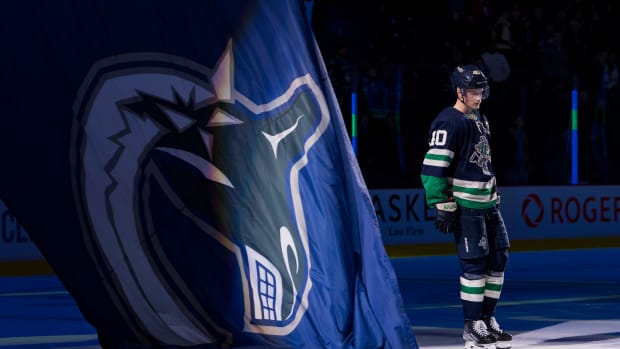The Vancouver Canucks have been a slightly more competitive team in recent games, going 5-4-1 in their past 10 contests. But that’s not nearly enough to justify Canucks management choosing to go to battle with the same group of talent for the rest of the season. This can’t be the second year of them fighting uphill through the final three-quarters of the year, only to fall short of a playoff berth.
Even then, even if they did beat the odds and clawed their way back through the Pacific Division’s bottom half, and did wind up earning a low post-season spot, does anyone not employed by the organization really believe the Canucks can do any sort of damage once they get to the end of the year?
It’s clear now, after nearly one-quarter of the season, that Vancouver simply does not have the depth of talent, particularly on defense, to be a serious Stanley Cup contender. And that means GM Patrik Allvin and president of hockey operations Jim Rutherford must take an axe to the roster, keeping a handful of young players and shearing off the rest for whatever they can get on the trade market.
That means veteran forwards Bo Horvat, Brock Boeser and Connor Garland should be on the trade block. That means veteran defenseman Tyler Myers should join them there. Only Myers has a no-movement clause in his contract, but as per Cap Friendly, that’s only a modified NTC, with Myers able to submit a list of 10 teams he can’t be dealt to.
All those four players represent the best assets Vancouver has to rebuild for the future. By the time the Canucks’ young stars worth keeping – D-man Quinn Hughes and forward Elias Pettersson – are in their prime, Horvat, Boeser and Garland will be in or approaching their thirties. It doesn’t make sense for the Canucks to clutch hard to all of the aforementioned talents just to come back year after year with the same brutal result.
And please, don’t tell us Vancouver can’t handle a full-on rebuild. People said the same thing about the Toronto Maple Leafs before a strong and confident Brendan Shanahan was hired to do exactly that. After a couple of years of pain, the Leafs wound up with Mitch Marner and Auston Matthews – cornerstone talents that teams simply don’t acquire in a trade. And Leafs fans completely understood what was going on. They understood your best option for rebuilding is always through the NHL draft. That’s the direction the Arizona Coyotes and Chicago Blackhawks have chosen, and the onus for them now is on their drafting and development teams.
In the short term, it will be unsettling for Canucks fans to see familiar faces shipped away. But the other option – doubling down, once again, on a roster that is too good to be completely bad and too bad to be completely good – is even less palatable.
Rutherford and Allvin can’t take the road this franchise has always taken. The small cash windfall that comes with playing one playoff round is not what Canucks fans and ticket-holders want out of the hard-earned money they put into the organization. Ultimate team success is what Vancouverites are all about.
Allvin has a couple of untradeable contracts at the moment – forward J.T. Miller and D-man Oliver Ekman-Larsson are shackled together with the franchise for a long time to come – but the Canucks cannot allow their presence to overshadow the macro picture. The time to make cold-blooded, logical moves arrived quite some time ago, and there’s no more questioning it’s now time to demand them.
The idea some of the heat has been dealt with in Vancouver’s past 10 games is high comedy. A 5-4-1 mark, in any market with a serious management team, is to be sneered at, not used as a sign things are improving.
If it weren’t for the spiralling Anaheim Ducks – who have just one fewer win and four fewer standings points than Vancouver has – the Canucks would be dead last in a weak Pacific Division.
There’s bound to be more pain in the Canucks’ future. But there’s a pain that can be tolerated if the big blueprint for success does what many NHL teams have done over the years: give them a cause for legitimate Cup hope in a couple, or few, years from now. Vancouver can return to pretending they’ve got a Cup contender that needs a few complementary additions, or it can get real.



